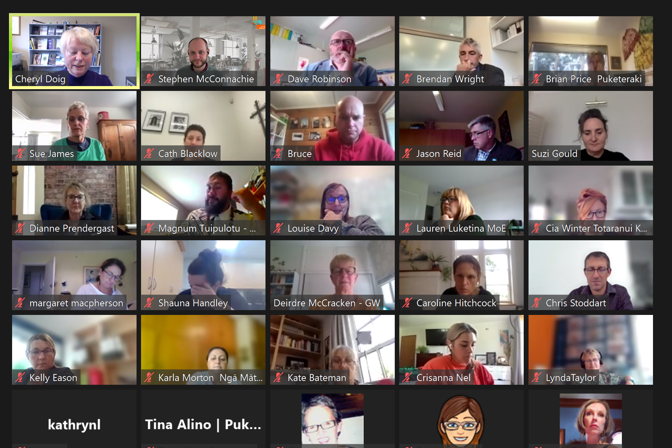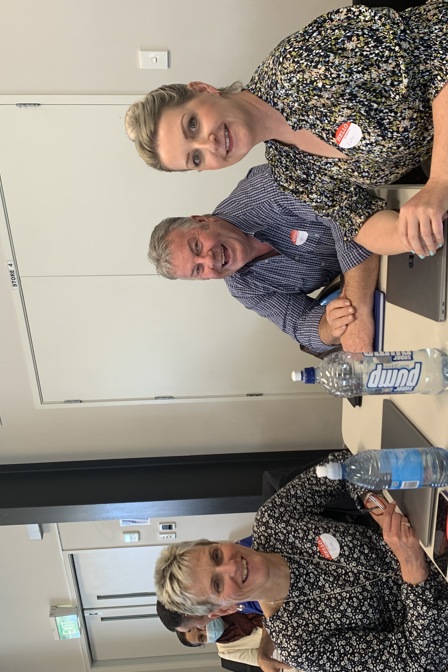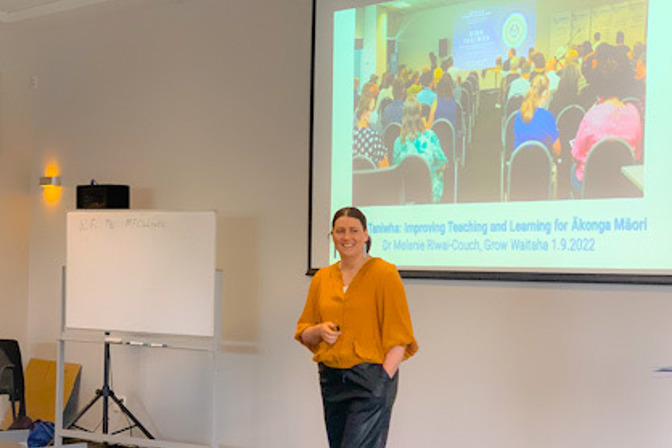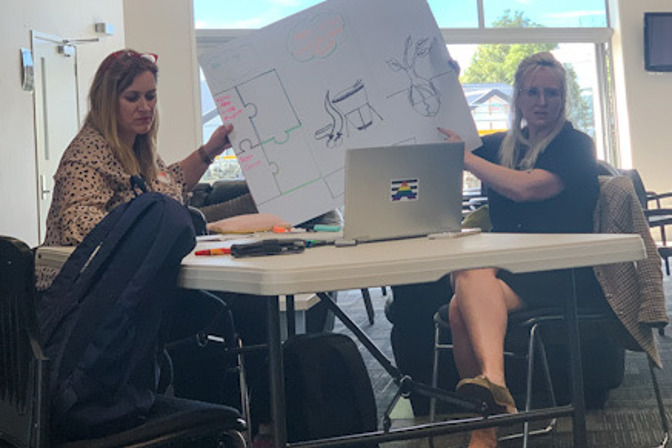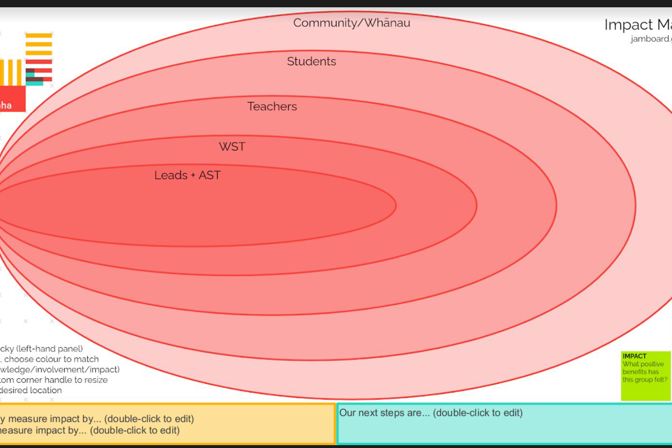Canterbury Kāhui Ako Leadership Network – Pathway to success
What is it?
With various upcoming changes in education, collaboration and connectivity across and between Kāhui Ako and Clusters in Waitaha, will become more important than ever. To enable these connections to take place, the Canterbury Kāhui Ako/Cluster Leadership Network gets together as a community of practice once a term for a half day or whole day hui. During each hui, Lead principals, Across School and Within School Leaders get the opportunity to celebrate each other’s successes, collaborate and share ideas, as well as being provoked by exciting new thinking from facilitators and guest speakers.
The Grow Waitaha facilitation team of Cheryl Doig, Deirdre McCracken, Suzi Gould, and Stephen McConnachie bring this group of 29 Kāhui Ako or clusters and 148 leaders together to engage them with new learning, practices, and frameworks.
Leaders tackle challenges such as role clarity, navigating power differences, connecting with whānau and community, and building positive working relationships – particularly in an online environment. Common themes have emerged including:
- Pathways / Transitions
- Cultural sustainability
- Student agency / learner-led
- Local curriculum / environmental
- Wellbeing / hauora
- Literacy
- Student engagement - students at risk, attendance
- Innovation / future-focused
- Use and impact of digital tools
- Growing Connections
- Curriculum (such as Assessment for learning, Aotearoa NZ History)
The facilitation team has created an environment that nurtures collaboration and deepens critical thinking around learning, contexts, and themes that are important to Kāhui Ako.
The Community of Practice also acts as a connection point between Kāhui Ako leaders and the Ministry of Education. Ministry of Education representatives provide relevant information and updates, and engage with leaders present.
Useful tools
During hui, the facilitation team shares research, case studies, and tools to support leaders’ practice. Below is an outline of some of the tools used by the group during hui throughout 2022.
Stakeholder mapping
This tool enabled leaders to map out the impact a particular initiative, element or context has on stakeholders at different layers. It provides a visual element to see what voices are being heard and represented, and where there are gaps.
The graphic also provides an opportunity for leaders to map out how impact is currently being measured, and how it could be measured in the future.
As Stephen McConnachie (facilitator) states, “It’s really helpful to visualise how the work impacts different people in the Kāhui Ako community. Revisiting the tool with a few different lenses can also prove useful to leaders.”
Story hui
Story hui was a tool explored at the September 2022 hui. It is a tool that can be used to:
- bring data to life visually
- to show change, relationships and connections within a school and in learning.
During the hui, leaders were asked to share something that has built relationships with ākonga and whānau to improve teaching and learning. The story is drawn as the storyteller tells their story of success, challenge, or achievement in their Kāhui Ako.
As described by facilitator Suzi Gould, “This tool can be used within Kāhui Ako like a handshake – it’s a connection between people. It is about visual representation, seeing the story you have told in image format. It can be a form of communication that can be shared in a newsletter, at an assembly or during a management hui.”
Menu board
Participants have access to a menu board following each hui. This is a resource which comprises all the resources, sounds bites, slide decks, and website links from each hui that can be accessed by the group at any stage. It enables those unable to attend, or who only attend for part of the sessions, to access these materials retrospectively.
Working together – Collaboration is key
The facilitation team have two important aspects they want to address in 2022:
- Aspect 1: a focus on coherent, evidence informed practice within a Kāhui Ako/clusters, so that there is a shared focus – which is clearly understood by all stakeholders – and that success can be measured and communicated
- Aspect 2: Promoting purposeful collaboration between Kāhui Ako/clusters.
The facilitation team acknowledges that trusting, learning based, and professional relationships improve leaders’ practice. Leaders work together and improve each other’s practice in specific areas relevant to their Kāhui Ako or cluster. They continue to openly share, identify and articulate their own strengths, weaknesses, challenges, hurdles, next steps and gaps, in a way that benefits other leaders.
Rachaelle Stidder and Nadene Brouwer, Across Schools Leaders within the Waimairi-iri Cluster, have found attending the sessions extremely helpful. Attending the network hui gives them the chance to collaborate with others, listen to and explore what others are doing.
“[It] was so useful being able to hear other AKAL and their innovative ideas and how they have been actioned. One example of this was about Matariki and ways different Kāhui had invited their learners and whānau to participate in events. This was invaluable as we were able to adapt and share these ideas further.”
Nadene Brouwer, Across School Lead, Waimairi-iri Cluster.
“I have really enjoyed the COL/Kāhui Ako network huis - the last one I attended I found really encouraging and it was so nice to both hear about and explore what others were doing, but also having the opportunity to inspire others ourselves. I spent the afternoon session retelling the wellbeing Teacher Only Day we ran for our Kāhui kaiako and support staff to the interested group that joined me. It was great and we always learn more when we are given the space (and opportunity) to do so.”
Rachaelle Stidder, Across School Lead, Waimairi-iri Cluster.
Tackling challenges together
An important part of the Community of Practice (COP) is to explore ways to tackle challenges that arise for each Kāhui Ako/cluster.
A challenge for Kāhui Ako/clusters is ensuring connection and communication with their whānau and community.
Melanie Riwai-Couch engaged leaders with the opportunity to explore her book Niho Taniwha. Together the COP began unpacking the importance of whanaungatanga and whānau-school partnerships in order to continue strengthening these relationships and ensure the teaching and learning experiences are positive and uplifting for ākonga Māori.
“This session was hugely thought-provoking, you have cleared some fog, stunning!”
Brian Price - Puketaraki Kāhui Ako.
A key takeaway from Melanie’s talk echoed by the audience was Maya Angelou’s quote, “Do the best you can until you know better. When you know better, do better.”
Why it works
Cheryl Doig, Grow Waitaha facilitator, highlights why you should get involved in this COP:
“This Community of Practice really highlights the importance, need and usefulness of powerful collaboration. It gives participants the opportunity to add power and dynamic to their work. It provides further enablement for Kāhui Ako and cluster leaders to get their respective schools moving, but also feed off ideas of others. The Community of Practice helps to break down barriers and build meaningful learning ecosystems, which is not necessarily happening in other Kāhui Ako networks across the country.”
What’s next?
The next hui for the Canterbury Kāhui Ako Leadership Network is a face to face hui at the McFadden Centre on the 23rd November.
If your Kāhui Ako or cluster is interested in attending this hui or future events:
- Sign up to the Grow Waitaha newsletter
- Check out our Grow Waitaha events page
- Contact Cheryl Doig c.doig@thinkbeyond.co.nz or Lauren Luketina Lauren.Luketina@education.govt.nz.
Useful links & resources
This list contains links for useful websites and stories of impact:
- Communities of Learning | Kāhui Ako (Ministry of Education)
- Communities of learning Kāhui Ako - Collaboration to improve learner outcomes (Education Review Office)
- Puketeraki Kāhui Ako collaboration in action (Grow Waitaha Story)
- Christchurch Catholic Kāhui Ako - Bridging and celebrating diversity (Grow Waitaha Story)
- A guide to support the development of collaborative practice in Communities of Learning

